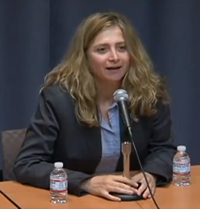
Samar Yazbek, a Syrian journalist and dissident, is on a crusade to build international support for the Syrian rebel forces. As part of her first tour of the United States, Yazbek spoke on September 19 at Luce Hall about her experiences and offered thoughts on the war engulfing the Arab nation.
“I want to talk directly to the students here,” announced Yazbek. “I want you to start a movement to pressure your government to help stop the brutal massacre that’s going on right now.” The talk, translated from Arabic to English by Amaar Al-Hayder of the Council on Middle East Studies at the MacMillan Center, also included a question-and-answer session. Yazbek was introduced by Bonnie Rose Schulman, the managing editor of the Journal of Middle East Women’s Studies, which co-sponsored the event with the Council on Middle East Studies and the Orville Schell, Jr. Center for International Human Rights.
Yazbek, who had chronicled her experiences into a best-selling book titled “A Woman in the Crossfire: Diaries of the Syrian Revolution,” divided her talk into three parts. The first part focused on why the Syrian revolution occurred; the second on how the protest turned into sectarian warfare; and the third on the Syrian Free Army and “exaggerated” allegations of jihadist involvement. Yazbek’s published column in The New York Times in late August was also distributed at the beginning of the program.
A large portion of the talk was dedicated to emotional descriptions of government brutality that she witnessed firsthand. In Damascus, for example, Yazbek described how men and women would carry olive branches when they protested as a symbol of peace. But the regime forces did not care; they beat protesters until their bones broke. Snipers fired from nearby buildings. “It came as a shock to us,” she said. “because the person next to you would be standing one second, and then, without a warning–no bullet sounds or screams or yells–you would just see an explosion on their head.”
According to Yazbek, “It’s an unjust war. We have trained killers with advanced weaponry against people with simple guns. It’s remarkable we have gotten this far.” To her, a no-fly zone would ensure the rebels’ victory. “If we can close the skies to them, Assad will be gone,” she said.
The situation in Syria, Yazbek emphasized, needs to be resolved quickly; otherwise, the revolution will grow into a sectarian war with jihadist involvement. The Assad regime is currently trying to pit Sunnis against Alawites through homicide setups and rumor mills. The people who don’t know that the massacres are regime-backed, she said, are getting impatient and may start to build toward a war between the two sects. Jihadists, she said, have tried to sneak into Syria and establish themselves in the movement, but the Free Syrian Army has adamantly rejected them. “So we are basically in battle on three fronts,” she said. “First, the regime forces; second, the sectarianists; and third, the jihadists. We don’t know how long we can keep up this fight.” Yazbek ended her lecture with the point that Syria will go back into the “dark ages” if Assad doesn’t leave soon.
